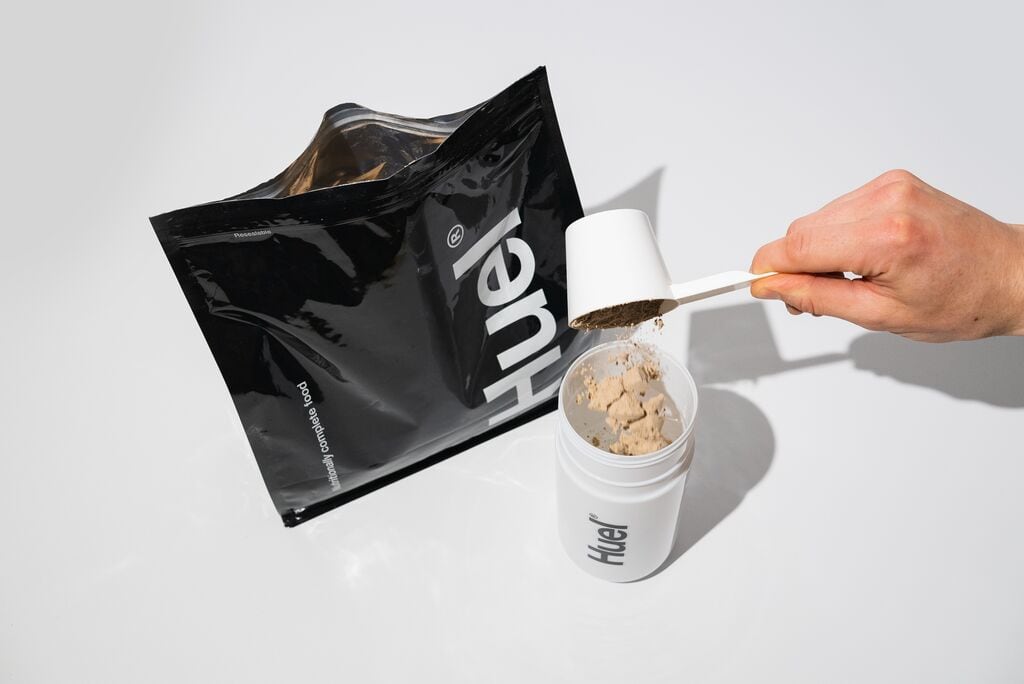In just over 10 years, Huel has emerged into a household name within the food and drink sector. Initially centred around meal replacement powders, the brand now offers a range of different products including read-to-drink meals, protein-rich snacks and energy drinks.
Collier, who co-founded Huel (a combination of the words Human and Fuel) along with the company’s principal founder Julian Hearn, has also evolved his own outlook during that period, a process which has included taking a slight step back from his day-to-day responsibilities.
While he continues to work part-time at the firm as chief sustainable nutrition officer, Collier has moved into the thought leadership space through his social media presence, Substack page and new book ‘Well Fed: How modern diets are failing us (and what we can do about it)’.
On sale since last month, the former NHS dietician introduces readers to his five pillars of contemplative nutrition, and theorises how we can develop a more sustainable and healthier food system.
The evolution of Huel
“We originally started out with the white pouch powder, which was version 1 back then but is now onto version 3.1, before introducing the Black Edition powder, which is the higher protein and lower carb version, the original RTD product and, more recently, the RTD Black Edition which is now available in four flavours,” Collier said, offering a quick rundown of Huel’s product range evolution over the last decade.
“Then we also have hot and savoury pouches, which we are also moving over to pots. This includes the noodles and pastas which are really good and perhaps closer to a foodie-type product.”
This shift towards offering more ‘traditional’ meal options, in addition to the powders and RTD options, took place in 2020 and has helped the brand reach a new customer base since.
“The concept of a meal as a powder or drink wasn’t initially intuitive to some people,” Collier explained.
“So we have widened our offering of complete nutrition into different formats, because why wouldn’t we? When we were looking at savoury, the idea of a savoury powder was a little bit weird, so I think something warm you can eat with a spoon makes more sense.”
A new perspective
Prior to the launch of Huel in 2014, Collier worked both as an NHS dietitian and in the health and fitness industry as the co-owner of bodybuilding forum MuscleTalk. This gave him a unique insight into nutrition, but it was only after Huel started that he began looking into the sustainability aspect of our food system in more detail.
“Our products have always been plant-based and possessed strong environmental credentials, but I wanted to dig into the science behind it,” he recalled.
“It was during this process that I saw how much more there is to food and the food system than what we put in our bodies on a daily basis.”
This realisation triggered Collier to dramatically change his diet around 2019, reducing the amount of animal-derived products he consumed and thinking more deeply about welfare standards within farming. Then, when the Covid pandemic started a year later, he began writing essays about his approach, and this quickly snowballed into the basis for his new book.
“The theme of the book is contemplative nutrition, which is my dietary philosophy that is focused around what individuals can do to make positive changes that impact both themselves and the wider planet,” Collier said.
“The book took me a few years to write and then a while longer to find a publisher before I met with HarperCollins. They loved the book but wanted me to change about three chapters, which was soul destroying at first, but it soon became clear that it was the right move.”
At the moment, Collier gets around 10% of his calories from animal products, which is about 20% less than the Western average. This includes a few days a week that are entirely plant-based and generally smaller meat portions on other days.
“If people want to go vegan and it suits their lifestyle, brilliant, that’s even better,” he added.
“I have an argument with myself in the last chapter of the book about whether humans should be vegan. If you’re a vegan or a carnivore, you’re likely going to be disappointed.”
Future focused
Collier has something of a ‘futurist’ approach to food, which means that he is interested in solutions and possibilities that at present may seem unrealistic.
“Being a futurist doesn’t mean you have to get rid of everything we have done in the past,” he argued.
“It just means accepting future technologies and combining them with existing methods.”
Issues on Collier’s mind currently include the challenge of feeding a growing global population, food waste, the risk of non-communicable disease and the use of ‘cruel’ farming techniques.
“There is a way of eating that addresses all these different motivations simultaneously, while embracing a mix of modern technologies,” he said.
“I have a certain bias of course as the creator of Huel and I think it has a role to play, but I am not under the impression that it is the only solution out there.”
Despite being very clear in his diagnosis that the global food system needs to change, Collier is open-minded about how this process will take place.
“We need an embedded approach from farm to fork, which includes controlling the use of intensive farming and adopting new techniques like regenerative agriculture, novel proteins, vertical farming and cellular agriculture,” he continued.
“All of these technologies are part of the solution, but getting people to accept and adopt a new way of eating and producing food is going to be a challenge.”
Collier has advocated for a multi-pronged approach that involves top-down guidance from governments, collaboration with food companies and scientists, and bottom-up participation and support from individuals and communities, both in person and online.
“Policymakers don’t have to be academics to fix our food system, but they need to be able to listen and seek the advice of scientists,” he concluded.
UPFs and next steps
The debate around UPFs and whether we should shift away from them has been animating much of the food and drink sector for the past few years. First used in 2009, the term has its roots in academia but has since broken containment and is now commonly discussed in the media and online.
“UPF is a useful term, but it has limitations,” Collier said.
“In an academic or epidemiological sense, it has value as a classification, but when you trace its usage, the term is used very differently from study to study. There is no concrete definition and even NOVA has updated its framework, and academics will acknowledge this before using it in their next sentence. I will only use the term UPF when having a conversation about it and trying to bring about some nuance.”
Despite the term ‘junk food’ declining in its usage over the past 10 years or so, Collier believes it still has value because it is widely understood among the general public.
“It has some playfulness and vagueness, but people know that a little bit of junk in an otherwise balanced diet is ok,” he added.
“As humans we like to put things in boxes and currently the UPF box is considered to be bad. This just isn’t good enough when you have pieces of research, such as the 2023 Lancet study which showed that certain wholemeal breads and meat alternatives classified as UPFs were associated epidemiologically with a lower risk of disease. It is not black and white.”
This topic is among the many that Collier intends to keep writing about moving forward. While his first book only went on sale last month, he is already thinking about ideas for a second title and his Substack.
“I am still active with Huel, but if I do write another book, I would love to look at a concept called ‘dietology’, which looks at the idea of diet ideologies,” he said.
“I want to tackle misinformation, but I also understand why we are so morally and emotionally attached to our food beliefs. Writing is a great process for this as it means I am held accountable for my ideas and it helps me reformulate them and come to new conclusions.”





